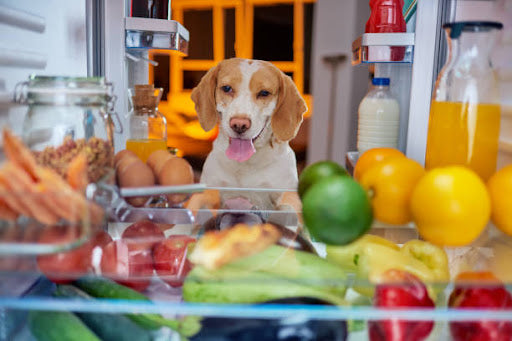
What Foods are Poisonous to Dogs?
When you’re a dog owner, you want to make sure your dog food is nutritious. Along with regular exercise and plenty of play-time, good nutrition is key to maintaining a healthy lifestyle. However, there are some foods we should be steering clear of when it comes to our dogs - the wrong snack can be downright poisonous to our beloved companion. Let’s look at some of the most common foods toxic to dogs and what symptoms might show if they ingest these food items.
Chocolate
Chocolate contains theobromine, an ingredient that is suitable for human consumption but is toxic to dogs. Dark chocolate has more of this chemical than milk chocolate, so dark chocolate is considered more dangerous for dogs than milk chocolate. The fat in milk chocolate can also cause pancreatitis, another complicating factor that will leave your dog sick. The amount of chocolate eaten matters: if a dog eats only a little, he or she might not show signs of poisoning, but might still suffer severe health problems.
Chocolate also contains caffeine. Caffeine in large amounts can cause rapid breathing, a racing heart rate, restlessness, vomiting, and diarrhea in dogs. Chocolate is the primary culprit of caffeine poisoning for most pets, but caffeine is also found in coffee beans, tea leaves (including green tea), & guarana.
The symptoms of chocolate poisoning in dogs are initially vomiting and diarrhea, followed by an abnormal heart rhythm, tremors, and seizures. If you notice any of these symptoms in your dog after you suspect chocolate consumption, head to your veterinarian immediately - even if your dog does not show any signs of poisoning yet.
Small amounts of chocolate can produce mild symptoms, including:
- Hyperactivity
- Increased heart rate
- Restlessness
- Vomiting
Death from chocolate toxicity is thankfully infrequent.
Grapes and Raisins
Grapes and raisins can cause kidney failure in dogs. The exact reason grapes are toxic for dogs isn’t known, but it may be an ingredient in grapes or a combination of different ingredients. It may also depend on the dog, as some dogs can eat small amounts with no problems. If you suspect your dog has consumed any amount of grapes or raisins, it is best to seek veterinary treatment immediately. Signs of grape or raisin toxicity may include vomiting, diarrhea, lethargy (tiredness), weakness, and abdominal pain. Affected dogs may also drink excessively and urinate more than usual.
Garlic and Onions
Garlic, onions, and chives are part of the allium family of plants, which is poisonous to dogs. When ingested, these plants can cause damage to their red blood cells, making them unable to carry oxygen effectively and leading to anemia and possibly death from oxygen deprivation. Garlic is considered to be about five times as toxic as onions for dogs. If you suspect your pup has ingested any plant from the allium family, contact your veterinarian for next steps.
Avocados
Avocados are high in fat, which we already mentioned as being a cause of pancreatitis in dogs. They also contain persin, an oil-soluble compound found in the avocado fruit (including the seeds), leaves, and bark of the tree that's toxic to dogs. Although most dogs won't eat avocados on their own because they don't particularly like their taste or texture, they may ingest large quantities of persin if they eat guacamole or other tasty snacks made with avocados.
Bones (especially cooked)
Bones are a great source of calcium for dogs, and chewing a bone can also be great for your dog's dental health. But there are some caveats to this. The bones you give your dog should be raw or uncooked. Cooked bones can splinter and cause stomach issues and even death which makes them extremely toxic. Bone-chewing should always be done under supervision, and the bone must be of a sufficient size for the dog chewing on it. Most vets will advise you against giving your dog chicken or pork bones (cooked or uncooked) because these tend to splinter and cause choking hazards or perforations in the digestive tract.
Signs of Food Poisoning in Dogs
Diarrhea
If your dog experiences loose stools or an upset stomach after eating, it could be a sign of a food allergy or poisoning.
Vomiting
Vomiting can occur and is often associated with diarrhea. These two symptoms may go hand in hand but can also occur individually. A dog with food poisoning will often vomit several hours after eating the offending food item.
Itchy skin
Itchy skin is a sign of a negative food reaction in dogs. While you aren't likely to see your dog itching his or her tummy, they may scratch their face or paws more often than normal after eating something foul. It may appear as hair loss in the itchy area if it is a vigorous or long term irritation.
Your dog's sensitive skin may be itchy for a few days after digesting food his or her body doesn't like. If itching occurs alongside any of the other symptoms of food poisoning in dogs, call the vet immediately.
The Bottom Line
Dogs will eat just about anything, but some of the items that they find lying around your house are outright dangerous and even deadly. Play it safe and keep any potentially edible items (not just the ones we listed here) behind cabinet doors or on high shelves. Remind guests in your home to keep the “people food” out of reach and off the floor. And most importantly, observe your pup’s behavior patterns for changes or disturbances - sometimes, our pets let us know when something is wrong, and you can be ready to help them if you know when to listen to them.
Top Stories

Why Do Dogs Lick Their Paws?

Why Do Dogs Whimper & Make Noises in Their Sleep?

Healthy Vet-Approved Homemade Dog Food Recipes

How To Cook Sweet Potatoes for Dogs






















